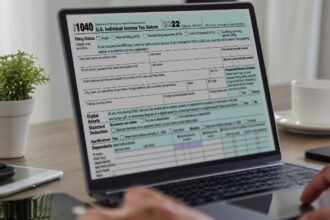In the fast-evolving world of finance, where efficiency and accuracy are paramount, lenders are increasingly turning to technology to streamline operations and enhance customer satisfaction. One transformative advancement is E-Recording, a digital solution that revolutionizes how real estate documents are processed and recorded. By eliminating the reliance on paper-based systems, E-Recording offers lenders a smarter, faster, and more secure way to manage critical documents like deeds and mortgages. At Countrywide Process, we’ve witnessed the profound impact of our E-Recording services on the lending industry. Let’s explore how E-Recording is reshaping document processing for lenders, saving time, reducing costs, and paving the way for a more efficient future.
What Is E-Recording for Lenders and How Does It Work?
E-Recording, or electronic document recording, is the process of submitting real estate documents, such as deeds, mortgages, liens, and assignments, to county recording offices digitally. Instead of printing, mailing, or hand-delivering physical documents, lenders can upload scanned or electronically prepared files through secure online portals like Simplifile or CSC’s ePrepare®. These platforms transmit the documents to the appropriate county, where they are reviewed, stamped, and recorded electronically, often within minutes. The recorded documents are then returned to the lender digitally, complete with recording stamps and other necessary information.
For lenders, E-Recording simplifies the post-closing process. Documents are prepared or scanned, uploaded via a web-based service, and sent securely to the county recorder. If errors are detected, the documents are returned quickly for correction, minimizing delays. At Countrywide Process, our E-Recording services ensure seamless integration with these platforms, allowing lenders to focus on their core business while we handle the complexities of document submission.
The Challenges of Traditional Paper-Based Recording
To fully grasp the benefits of E-Recording, it’s essential to understand the inefficiencies of traditional paper-based recording. Historically, lenders had to print multiple copies of documents, often requiring notarization, and physically deliver them to county recording offices via mail, courier, or in-person visits. This process was not only time-consuming, taking days or even weeks, but also prone to errors, lost documents, and costly delays.
Paper-based recording also incurred significant expenses, including printing, postage, courier fees, and check processing for recording fees. Moreover, the “gap period” between closing and recording left lenders vulnerable to risks, such as competing liens, which could jeopardize their first lien position. These inefficiencies strained resources and slowed down the lending process, frustrating both lenders and borrowers. By contrast, E-Recording addresses these pain points, offering a modern solution that aligns with the demands of today’s digital economy.
How E-Recording Benefits Lenders
Faster Processing Times
The most significant advantage of E-Recording is its speed. Traditional recording could take days or weeks, but E-Recording completes the process in minutes to hours. Documents are submitted electronically, reviewed by county staff, and returned with recording stamps almost instantly. This rapid turnaround reduces the gap period, ensuring lenders secure their lien position quickly and minimizing risk. For example, Simplifile, part of ICE Mortgage Technology, reports that documents can be recorded with just a few clicks, transforming workflows for lenders.
At Countrywide Process, our E-Recording services leverage these platforms to deliver lightning-fast processing, allowing lenders to close loans and move on to the next transaction without delay.
Cost Savings
E-Recording eliminates many of the expenses associated with paper-based recording. Lenders no longer need to budget for printing, postage, courier services, or physical check processing. Recording fees are paid securely via Automated Clearing House (ACH) transfers, reducing payment errors and check fraud risks. Additionally, E-Recording reduces labor costs by streamlining the submission process, enabling one person to handle recording from start to finish. According to e-Docs Solutions, these savings extend to storage and materials, making E-Recording a cost-effective choice for lenders.
Countrywide Process enhances these savings by offering tailored E-Recording solutions, ensuring lenders maximize efficiency without compromising accuracy.
Enhanced Accuracy and Fewer Rejections
Manual processes are prone to human error, such as incorrect document formatting or missing fees, which can lead to rejections and delays. E-Recording platforms like CSC’s ePrepare® provide automated checks and data validation, ensuring documents meet county requirements before submission. If a document is rejected, it’s returned electronically with clear reasons, allowing lenders to address issues and resubmit the same day. This reduces the frustration of repeated submissions and keeps the closing process on track.
Our team at Countrywide Process works closely with lenders to ensure documents are prepared correctly, minimizing rejections and maintaining compliance with local regulations.
Improved Security and Document Tracking
E-Recording offers superior security compared to paper-based methods. Original documents remain in the lender’s possession throughout the process, reducing the risk of loss or damage during transit. Electronic submissions are encrypted and transmitted securely, and payments via ACH eliminate the vulnerabilities of mailed checks. Moreover, E-Recording platforms provide real-time tracking, so lenders can monitor the status of their documents and access recorded files instantly. This transparency enhances accountability and simplifies post-closing workflows.
Countrywide Process’s E-Recording services prioritize security, using industry-standard platforms to safeguard sensitive documents and ensure compliance with regulations like UETA and ESIGN.
Environmental Benefits
By reducing the need for paper, E-Recording aligns with sustainability goals. Lenders can eliminate the printing of multiple document copies, saving trees and reducing waste. Additionally, E-Recording cuts down on fuel consumption from courier services, contributing to lower carbon emissions. As more counties adopt E-Recording, covering over 90% of the U.S. population, lenders play a role in creating a greener future.
At Countrywide Process, we’re proud to support lenders in adopting eco-friendly practices through our E-Recording services, helping them meet both business and environmental objectives.
Supporting Industry Trends and Compliance
E-Recording is backed by robust legislation, including the Uniform Electronic Transactions Act (UETA) and the Electronic Signatures in Global and National Commerce Act (ESIGN), which ensure electronic records are legally equivalent to paper documents. The Uniform Real Property Electronic Recording Act (URPERA) further promotes E-Recording by standardizing processes across jurisdictions. These laws, combined with growing county adoption, make E-Recording a mainstream solution for lenders.
Countrywide Process stays ahead of these trends, offering E-Recording services that comply with federal and state regulations, ensuring lenders can confidently transition to digital workflows.
Additional Benefits of E-Recording for Lenders
Beyond the core advantages, E-Recording offers lenders several practical benefits:
- Convenience: Submit documents from anywhere with a computer and internet connection, eliminating the need to visit county offices.
- Integration: Many E-Recording platforms integrate with loan origination and title software, streamlining data flow and reducing manual entry.
- Customer Satisfaction: Faster closings and fewer delays improve the borrower experience, enhancing the lender’s reputation.
- Scalability: E-Recording supports high-volume filers, with potential discounts for frequent users, as offered by Countrywide Process.
Our E-Recording services are designed to maximize these benefits, providing lenders with a seamless, end-to-end solution for document processing.
Conclusion
E-Recording is transforming the lending industry by offering a smarter, more efficient way to process real estate documents. With faster turnaround times, significant cost savings, enhanced accuracy, and robust security, E-Recording empowers lenders to streamline operations and deliver better outcomes for borrowers. At Countrywide Process, we’re committed to helping lenders harness the power of E-Recording through our expert services, ensuring compliance, efficiency, and peace of mind. If you haven’t yet embraced E-Recording, now is the time to make the switch. Join the thousands of lenders revolutionizing document processing with Countrywide Process and take your operations to the next level.






